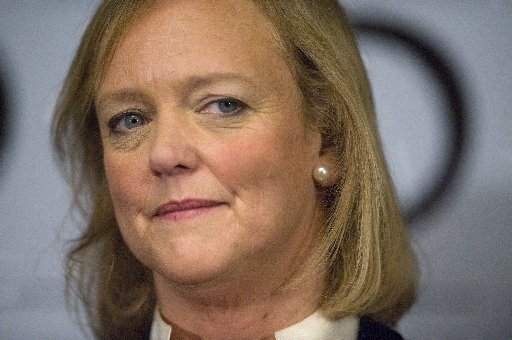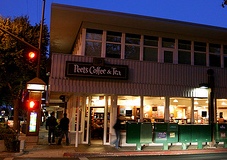Last week I had a chance to sit down with Gubernatorial hopeful Meg Whitman for the better part of an hour. Our interview covered a number of policy areas including global warming/AB32, eminent  domain, gun control, abortion, and philosophy about government. Because we had the handy FlashReport digital recorder along, we’ll be able to bring you some direct excerpts from the interview.
domain, gun control, abortion, and philosophy about government. Because we had the handy FlashReport digital recorder along, we’ll be able to bring you some direct excerpts from the interview.
THIS IS THE SECOND INSTALLMENT OF THIS INTERVIEW. YOU CAN READ PART ONE (ON THE ENVIRONMENT, GLOBAL WARMING, AND AB 32) CLICK HERE.
Because of the location at which we met in Menlo Park on the San Francisco Peninsula, we’re calling these "Excerpts From The Peet’s Coffee Interview" — and here is a segment where we discuss the topic of eminent domain. From the exchange, you will see that Whitman takes a very conservative position on this subject, and opposes use of eminent domain by governments for economic gain. Enjoy! Flash.
we’re calling these "Excerpts From The Peet’s Coffee Interview" — and here is a segment where we discuss the topic of eminent domain. From the exchange, you will see that Whitman takes a very conservative position on this subject, and opposes use of eminent domain by governments for economic gain. Enjoy! Flash.
Flash: What is your thought about when eminent domain is appropriate? What are appropriate uses for government’s ability to take property forcibly versus what would be abusive?
MW: My view is that it should be very hard for the government, or a city, or a county to take people’s property rights. Property rights is a core part of, I think, why people live in America. Think about the history of owning property in the United States. It’s the American dream. There may be a small number of occasions where it makes sense for the government – whether it’s public safety, whether it’s hospitals, whether there’s something that the county or the city absolutely needs where there is no other alternative, but I think it should be an alternative of last resort.
Flash: So, I guess maybe to get more specific, like for example, we probably can agree that it would be an appropriate use of eminent domain if you want to put in a highway or if you want to build a school on a particular site, maybe, if you want to build a bridge.
MW: Yes.
Flash: What about when eminent domain is used for economic development?
MW: And when you say economic development purposes, do you mean a mall or, do you mean…
Flash: Well, let’s say that Peet [of Peet’s Coffee] – Pete’s not a real person, I don’t think – but if Pete owned this coffee shop and the City of Menlo Park decided they had an opportunity, because there were two other parcels owned, and they could put something here that would generate more taxes for the city than Pete’s Coffee –And Pete says, “I don’t want to lose my coffee shop here”, and they would say, “Well, we have a different plan and it makes more money for everybody. We think it’s for the greater good.” It’s, in essence, a Kelo decision situation. Would you be supportive of something like that?
MW: My view is – it’s hard to go after abstract notions, but generally speaking, I don’t think the City of Menlo Park should be able to grab Pete’s Coffee because they think they could put something over there and something here that would create more tax revenues.
Flash: This happens a lot, and it’s all about tax revenues. There’s a lot of people who lose their home because they want to create their auto mall area, because auto malls produce tax revenues.
MW: In New York, there’s the development around one of the ballparks there, where there is still a woman’s home literally surrounded by the ballpark because she wouldn’t give up her home.
Flash: There were some issues at Disneyland for a long time. The expansion that they did to their park, California Adventure, literally took years longer than Walt Disney had envisioned because there were several people that owned homes and they didn’t want to sell them.
MW: The strawberry farmer who I think still owns his land because he refused his sell.
Flash: Right. So they ultimately built around him.
MW: In general, I think people’s property rights absolutely need to be respected, and we should be careful to go down the slope where it’s okay for a road, it’s okay for a school, and therefore you could have sort of creeping authority. Again, I’d like to sort of look at it on a case by case basis, but I think I’m generally speaking in the same place as you are.
Flash: Okay, because this kind of abuse happens all the time. You’ll even have people who have land that has nothing on it at all and then, of course, government comes along and says, “We want to make your land into open space. So now when we pay you for your land, we’re going to value it as what it would be worth if you know you can’t build anything on your land.” And suddenly, somebody’s land that may be worth $5 million dollars is now worth $30,000 and that’s what they’re willing to pay you, and that becomes the taking.
MW: And in most cases that I’m familiar with, actually, the value of the land is accorded the value of developed land.
Flash: Well, it’s happening more and more where they’re now not really that.
MW: The cases that I’m familiar with tend to be more where the price that is paid to that owner is actually fully developed land, which usually is full value there.
Flash: I don’t know that that makes it any more morally correct.
MW: No. It doesn’t, but at least it isn’t undervaluing the property by saying, “You can put a Pete’s or a Starbuck’s on your land and we’re going to pretend you can’t”.
Next we’ll feature our conversation with Whitman about the issue of the sanctity of life and abortion…
Care to read comments, or make your own about today’s Daily Commentary?
Just click here to go to the FR Weblog, where this Commentary has its own blog post, and where you can read and make comments.

